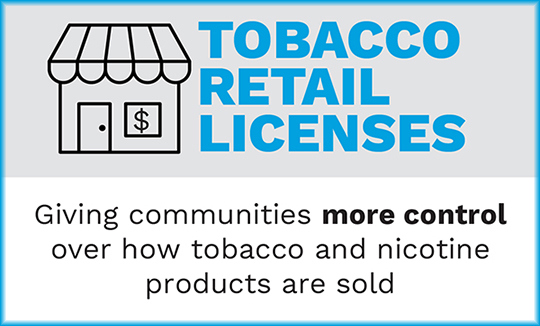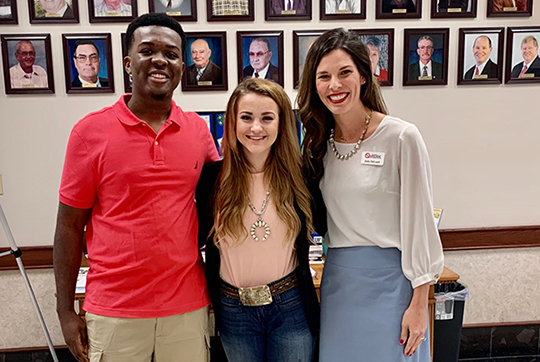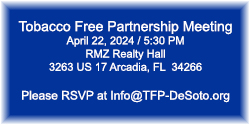News and Events
The Tobacco Free Partnership and Students Working Against Tobacco Work to Bring Tobacco Retail Licensing to DeSoto County
April 1, 2020
In order to protect people, especially youth, from the hazards of using and being exposed to tobacco products, we work on many initiatives here locally, however there is one major area of concern we have been working on lately, and that is Tobacco Retail Licensing.
The tobacco industry spends the vast majority of their marketing money in the retail environment – over $1 million/hour to promote their products, in which, most of their marketing efforts are aimed directly to our kids. Essentially, the tobacco industry is buying shelf space to keep tobacco visible and offering price discounts to keep tobacco cheap. These companies are no fool, what they are really “buying” is youth who initiate - adults who can’t quit!

In order to protect people, especially youth, from the hazards of using and being exposed to tobacco products, we work on many initiatives here locally, however there is one major area of concern we have been working on lately, and that is Tobacco Retail Licensing.
The tobacco industry spends the vast majority of their marketing money in the retail environment – over $1 million/hour to promote their products, in which, most of their marketing efforts are aimed directly to our kids. Essentially, the tobacco industry is buying shelf space to keep tobacco visible and offering price discounts to keep tobacco cheap. These companies are no fool, what they are really “buying” is youth who initiate - adults who can’t quit!
A few of the most notable concerns here in DeSoto County:
- Not a single store had signage stating ID was required for electronic devices
- 38% of stores did not have the required Florida "AGE OF SALE" sign visible to customers
- 94% of the stores had flavored cigarillos, all of which also had single cigarillos available
- 64% of the stores were engaged in smokeless tobacco promotion, compared to the state average of only 39%
- 56% of the stores were engaged in e-cigarette promotion
In 2019, The federal government declared youth vaping, or e-cigarette use, a nationwide epidemic. We have deeply felt that impact on our local community, and can blatantly see why, when not a single retailer has signage stating ID is required, and 56% of those stores are engaged in e-cigarette promotion.
As you can see, the retail point of sale is a big issue here in our local community. The data obtained throughout this monitoring phase gives insight into local issues and brings awareness to the lack of enforcement in the tobacco retail environment. Some of the most notable findings included areas for improvement with existing federal, local, and state tobacco regulations.
To protect youth and improve public health, local governments are turning to tobacco retail licensing to directly control the sale of tobacco products in their community. Essentially, it is a local law that requires all businesses that sell tobacco products to obtain a license from local government. On an annual basis, retailers must fill out an application, pay a pre-determined fee, and meet any other requirements outlined in the ordinance.
TRLs grant local governments more control and greater oversight over tobacco-related activity in their community. They can oversee 1) who can sell tobacco products, 2) what types of tobacco products can be sold, and 3) the penalty structure for illegally selling to minors or for being noncompliant with other tobacco-related policies.
Tobacco retail licensing has also been used to promote other innovative policy solutions, such as limiting the density of retailers per city square mile, banning establishments in close proximity to schools, and imposing additional restrictions on the sale and promotion of certain types of tobacco products that are particularly attractive to kids.
All in all, local TRLs give counties and municipalities more control over how tobacco and nicotine products are sold. As a result, youth access and exposure to tobacco and nicotine products decrease. In fact, a recent study found that young people who live in communities with a tobacco retail license policy that covers the cost of regular compliance checks are 33% less likely to start using cigarettes and 26% less likely to start using e-cigarette.

The Tobacco Free partnership and Students Working Against Tobacco is actively educating parents, educators, youth, and community partners on what they need to know to combat this epidemic. We are also educating decision makers and discussing the ways such an ordinance could benefit our rural community.
Combustible cigarettes remain the leading cause of preventable death and possess a significant - and avoidable - health risk to our young people! We cannot stand by and allow tobacco to attack another generation of young Americans. We must do our part as community leaders and parents and protect our youth from the deadly addiction to tobacco products!
If you would like to collaborate on this initiative, or join our task force, please contact Jodie DeLoach jdeloach@quitdoc.com.



